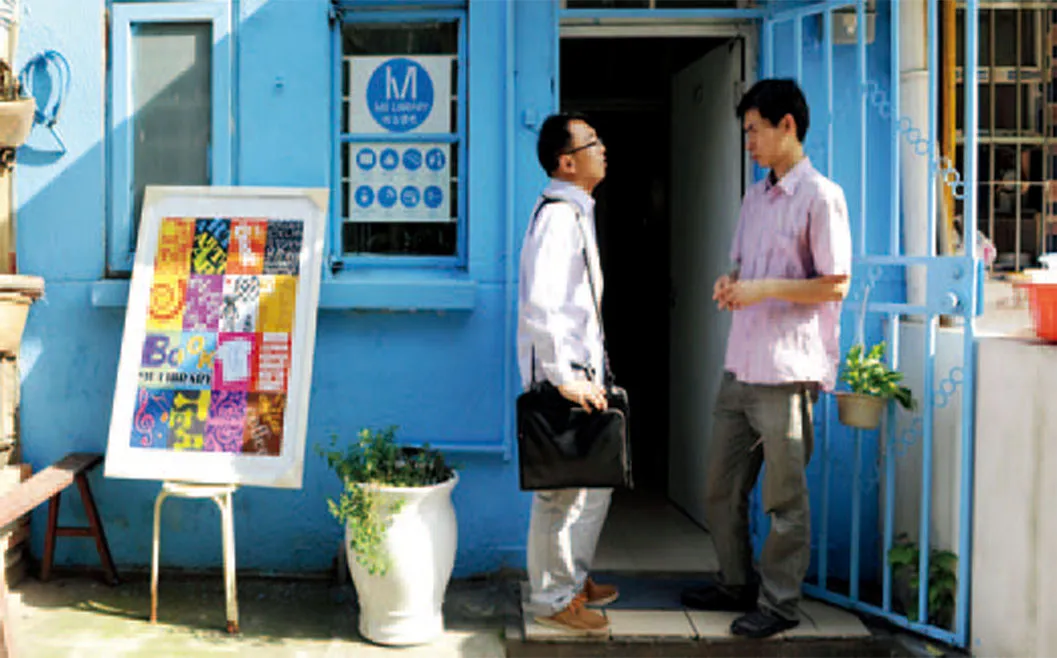Show and Tell
By Yuan Yuan
The European concept of a human library takes on a new life in China

FIRST MEETING: Lei Wanfeng (right)welcomes a reader to Me Library, a human library that he founded in Shanghai, on May 1, 2012
Ding Baoming thought her invitation to the Istarsea Library was to give a lecture.A novel idea, she thought. But when she arrived at the library in a university zone in west Beijing’s Haidian District on December 8, 2012,there were no novels to be found, nor any other books.
“The owner told me it is a ‘human library’where people share their stories instead of reading books,” said Ding during her “reading.”
Ding, born in 1962, suffers from polio and has been confined to a wheelchair since she was a year old. A self-taught tailor, she opened her own shop more than 20 years ago. Now she is president of the Beijing Boshi Clothing Co. Ltd.Last July, she went on a road trip with several other disabled people to see the Olympics in London.
More than 20 people, mostly young, were waiting for Ding at the library. The 120-squaremeter library is actually a regular apartment.Ding told her story as “readers” sat or stood wherever they felt comfortable.
Ding showed a video of her road trip to London and then told her business story.Participants were free to interrupt at any point to exchange ideas on the topics she discussed—the Olympics, traveling in Europe and tailoring. A woman with a disabled leg showed Ding decorations she made with crutches and they discussed the nuances of tailoring clothing for the disabled.
“It is a very relaxing and fun experience in the library,” Ding said in the end. “I want to participate in more events like this and encourage my friends to visit the library as well.”
Human books
“I believe everyone has his or her own stories to share,” said 29-year-old Li Xingning, founder and owner of the Istarsea Library.
Three years ago, Li announced her program of establishing a club for people to meet up and share stories on Douban.com, a Chinese social networking website. Soon after its publication,several people volunteered to join in it.
In the first two years, the club didn’t have a fixed meeting place. Their humble book salon convened in various locales and gradually evolved into a kind of oral tradition.
“It wasn’t until last year when a journalist told us what we were doing is quite like that of a human library,” Li said.
Human libraries originated in Denmark in 2000, aiming to reduce prejudices and promote tolerance and understanding via dialogue. The“books” of a human library are living people who volunteer to share their stories with “readers.” The idea has since spread to more than 45 countries around the world.
Li then decided to establish the first human library in Beijing. “My idea of being a ‘librarian’is not just to arrange books on the shelves, but also to organize readers to sit together and talk,” she said.
To accomplish this, Li took a year off from her job as an architect and spent time locating and decorating her dream library. “The ladder I used to paint the wall is still in the library, now as a decoration,” Li said.
The library opened on December 25, 2011 with six “human books.”
One of the first “human books” of the Istarsea Library is Yu Shi, a 25-year-old man who quit his job as a technician in an IT company in Beijing and traveled from southwest China’s Yunnan Province all the way to Beijing. Yu made a living selling handmade postcards and singing on the street.
“I share my story to encourage more people to go for their dreams,” Yu said. “I want to tell them once they go out of their comfort zone, they can find the beauty of life that they’ve never imagined before.”
In recent years, human libraries have sprung up across China.
Han Lian, a graduate from Nanjing Normal University (NJNU) in east China’s Jiangsu Province, knew the idea of human library when she was an exchange student in Hong Kong in 2005.
After returning to NJNU, Han opened a bookstore on campus and tried to promote the human library, but it didn’t catch on until she graduated in 2007.
Despite the setbacks, Han didn’t give up. In March 2012, she successfully held three human library events in Chengdu,capital of southwest China’s Sichuan Province.
Last May, Han wrote a letter to Song Yongzhong, President of NJNU, proposing to organize a human library event in celebration of the university’s 110th anniversary.
With Song’s support, Han invited 11“human books” to meet NJNU students on September 15, 2012. The event proved to be a hit.
At the second human library event in NJNU on November 29, four “human books” were present.
Chen Shi, a college student, told stories of his trips to Tibet Autonomous Region, Xinjiang Uygur Autonomous Region and many other places on the Chinese mainland during summer and winter breaks on a shoestring budget.
“We always want to travel around the world yet find plenty of excuses not to set off, such as lacking money and time. But as long as you really make up your mind, they are not problems at all,” Chen said.
Lei Wanfeng now runs a human library in Shanghai. After graduating from university in central China’s Henan Province up in 2007,Lei went to Shanghai and teamed with several friends to open a bookstore in 2010. It went bankrupt within a year.
Marveled with the idea of human library, Lei opened a new bookstore called Me Library, in Shanghai last year. He has regularly invited people to share stories with “readers” in Me Library,which is packed with people from all over the world during these events.
Localization
“China has the soil for human libraries as people from different social backgrounds really need to talk,” said Wang Zizhou, a professor at Peking University’s Information Management Department. Wang and his student Wu Hanhua are widely known as the first to introduce the idea of human library to China.

Wang lists migrant workers, cancer patients,folk artists and disabled people as the ideal “human books.”
Chen Shiyu, a college student from Shandong Province, made a much longer list,adding homosexuals, HIv sufferers, sex workers and drug addicts. But she was disappointed that nobody in these groups was willing to show up. Furthermore, Chen said that only a few patrons of I-Think Library, which she founded last October, have any interest in talking with social pariahs.
“The purpose of human libraries is to eliminate prejudices, but it doesn’t seem to be working in China,” Chen said. “When I ask ‘readers’ whether they have prejudices, they always say no. I think they don’t even know they have them.”
Chen once invited an urban management officer to his library. But as soon as the officer sat down, readers threw harsh words at him based on reports about some urban management officers’ misconduct. “That event almost went out of control and the officer had to leave awkwardly,” Chen said.
Successful people invited to human libraries, such as entrepreneurs, always appear to be popular and some are keen to awe young people by bragging about their achievements. Reportedly, when a civil servant came to share a charity trip story,he was frequently asked about how to pass the national civil service exam.
Another challenge—and one also shared by many typical libraries—is funding. Currently, Chen holds human library events in different places each time as she cannot afford a fixed place.
“My colleagues and I have put almost all the money from our pockets into the library,” Li said. “We cannot even make ends meet, not to mention make a pro fit.”
But Li is still happy with the program.“The library is like my home now and all the friends here form a big family,” Li said,adding that some readers offered to pay extra money as they learnt of the library’s financial difficulties.
“I would be very satis fied just to make ends meet. If not, I would run the library until I don’t have a penny in my pocket,”Li said. ■

